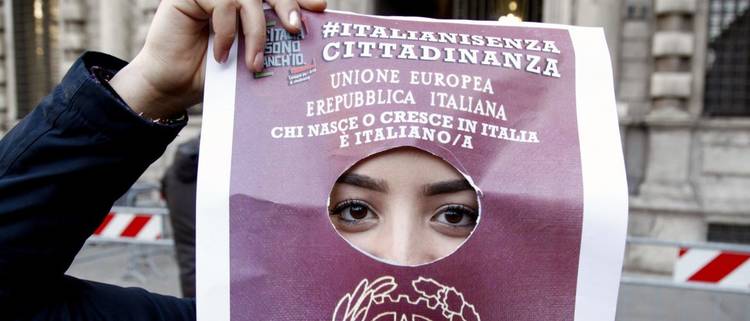


ROME -- The Latin words are in every headline these days, or so it seems: Ius soli, or, as written in English, Jus soli. This translates as "right of the soil," or citizenship by birthright. The struggle for recognition of this right is just now feeding into the battle over immigrants, which looms as the essential battle facing political Italy. The words are all the more potent as parties face local election runoffs and seek power alliances that will promise victory in the national general elections slated for early next year.
The law on ius soli was first proposed a quarter century ago. One year ago it was approved, with countless amendments, by the Chamber of Deputies, and is now before the Senate. If passed there, it will give the 800,000 children born and raised in Italy of immigrant parents the right to become Italian citizens. (For a video showing 17 children without citizenship -- already viewed by 35,000 -- see >> [2] )
Because many of these parents fled repressive regimes or war, and cannot return, in no way can their children be shipped "back home" to become citizens of Yemen, Nigeria or Syria. Lacking citizenship in Italy, the only country they have ever known, they remain stateless. Needless to say, their immigrant parents are required to pay taxes but are not permitted to vote.
The new bill before the Senate has the backing of former premier Matteo Renzi's Partito Democratico and of Paolo Gentiloni, premier since last December. It would overturn the current legislation on citizenship, based on iuri sanguinis (birthright by a blood line). By its terms citizenship is granted to the child only if he has an Italian parent. (In theory, citizenship can be requested after ten years of residence in Italy, if, among other things, the person making the request demonstrates having "sufficient income for maintenance.")
The bill is strongly, not to say violently, opposed by Matteo Salvini and his Northern League (in fact, now the all-Italian League). In the Senate on June 16 the League's deputies put on such an aggressive anti-ius soli demonstration -- "a jousting match of shoving, fighting, punches," in the words of one witness -- that a few senators who back the law wound up in the infirmary. The injured included Senator Valeria Fedeli, Minister for Universities and Research, who injured her arm when she was shoved into a railing. A Northern Leaguer screamed at a fellow senator who was pro-ius soli an insult formerly reserved for Neapolitans or Calabresi: "You Southern of shit." Outside the Senate at the same time 200 opponents of the bill were demonstrating with the backing of the notorious Casa Pound. Some raised their arms in Fascist salutes.
Joining Salvini in opposing the bill is Beppe Grillo's Movimento Cinque Stelle (M5S), which had previously approved it. But now, declares Grillo, "It [the bill] is an unvotable mess." Salvini says he is pleased with Grillo's about-face, a flirtation that reflects the broader political agenda. The M5S is hurting from its losses in administrative elections earlier this month. Not surprisingly, Grillo's move toward the Northern League coincides with that shellacking, obviously enough that one PD senator called their unholy new alliance "a dry run" for the two parties in the future.
Echoing this warning was Monsignor Nunzio Galantino, general secretary of the Italian Bishops' Conference (CEI). Speaking in Bologna, Galantino was sharply critical of both the scuffle in Parliament and of Grillo, "to whom only self-interest matters." At the same time, however, elsewhere in Bologna demonstrations against the bill were taking place, promoted by the far right youth organization Gioventù Nazionale. Northern League Senator Roberto Calderoli did not hesitate to reproach Mons. Galantino, and Pope Francis as well, saying, "Dear bishops, think about Italians without jobs, housing or dignified pensions, and leave it to the Partito Democratico to go fishing in the pool of immigrant voters." (This ignores that immigrants cannot vote.)
Grillo's front-running candidate for premier is Luigi Di Maio, 31, Neapolitan and vice president of the Chamber of Deputies. Di Maio justifies the party's rejection of the ius soli bill on grounds that it is low among the nation's priorities, which instead are, he explains, jobs, business incentives, tax breaks for entrepreneurs who hire young people, and help for single-income families with children.
The Senate battle over ius soli is the parting shot for ever stronger clashes among the parties over immigration, which a may pave the way toward new electoral alliances. In 2015 Italy together with the stronger countries of the European Union voted a law permitting immigration and determining which countries would accept a certain definite number. Later, however, the Czech Republic, Poland and Hungary renigged on the obligation to accept the migrants, and will face fines from the EU as a result.
Source URL: http://ftp.iitaly.org/magazine/focus/op-eds/article/who-has-right-italian-citizenship
Links
[1] http://ftp.iitaly.org/files/cittadinanzaitalianajpg
[2] http://video.repubblica.it/dossier/riforme-da-non-tradire/ius-soli-ehi-lo-sai-che-non-sei-italiano/278807/279407